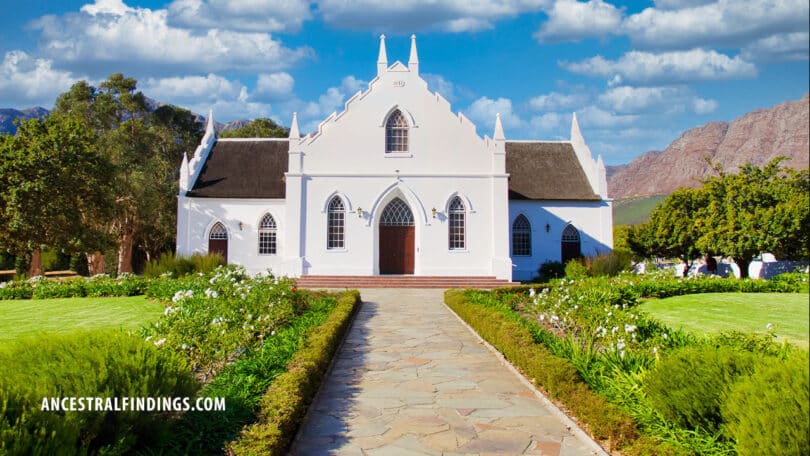Church and civil records are foundational resources for tracing ancestry in South Africa. Before formal civil registration was introduced, church records were the primary means of documenting life events such as births, marriages, and deaths. Even after civil registration became common practice, church records offered valuable details about individuals and families.
Let’s explore how to use these records effectively, what you can expect to find, and where to locate them.
The Role of Church Records in South African Genealogy
The church was often the heart of a community, especially in earlier periods of South African history. As a result, churches kept thorough records of their congregants’ life events, including baptisms, marriages, and burials. These records predate civil registration and offer a wealth of information that is often unavailable elsewhere.
1. Baptismal Records
Baptismal records are among the most significant resources for genealogists, as they can date back as early as the 1600s. These documents are particularly useful for confirming birth dates and parentage, as they often list both parents’ names, the baptism date, and sometimes even the names of godparents or witnesses.
Key Information Found in Baptismal Records:
- Child’s full name
- Date and place of birth
- Date and place of baptism
- Parents’ names (sometimes including maiden names)
- Godparents or witnesses (who may also be family members)
For example, the Dutch Reformed Church (NGK) kept detailed baptismal records during the early settlement period, especially in the Cape Colony. These can be invaluable for tracing ancestors from Dutch, French Huguenot, or German backgrounds who settled in South Africa.
2. Marriage Records
Marriage records provide crucial links between generations. These records often contain more than just the bride and groom’s names. In many cases, they include the names of the couple’s parents and even the residences of both families at the time of the marriage.
Key Information Found in Marriage Records:
- Names of the bride and groom
- Date and location of the marriage
- Names of witnesses and officiating clergy
- Often, the names and occupations of the couple’s parents
- Religious affiliation or denomination
Marriage records from Anglican churches are particularly useful for British settlers, while Methodist and Catholic records may be key for other ethnic groups. Mission churches often kept the most accurate marriage records for those descended from enslaved individuals or indigenous communities.
3. Burial Records
Burial records can sometimes be more detailed than death certificates, especially in earlier South African history. Churches recorded deaths and burials long before the government issued formal death certificates. Burial records may list the deceased’s age, cause of death, and sometimes even their occupation or family connections.
Key Information Found in Burial Records:
- Date of death
- Date and place of burial
- Age at death
- Cause of death (in some cases)
- Names of surviving family members
Burial records also sometimes contain additional notes from the clergy, such as social standing or whether the deceased received a Christian burial.
Civil Registration: A More Formal Approach
Civil registration in South Africa began relatively late, in 1895 when the government kept official records of births, marriages, and deaths. Civil records are a more standardized form of documentation than church records, often offering more comprehensive details. However, the depth of information can vary depending on the time period and location.
1. Birth Records
Civil birth records are crucial for confirming exact birth dates and parental information. They often include not just the names of the parents but their occupations, which can give you insight into your ancestors’ lives.
Key Information Found in Birth Records:
- Child’s full name
- Date and place of birth
- Parents’ names, including the mother’s maiden name
- Parents’ occupations
- Witnesses or informants of the birth
One significant benefit of civil birth records is that they usually provide more details than church baptismal records. When birth records are unavailable, a combination of baptismal records and other documents can still help build a family tree.
2. Marriage Certificates
Civil marriage certificates became standardized after 1895, providing more reliable information for genealogical research. These certificates are particularly valuable when church records are unavailable or incomplete.
Key Information Found in Marriage Certificates:
- Full names of the bride and groom
- Dates and places of birth for both parties
- Names of parents and their occupations
- Names of witnesses
- Date and place of the marriage
In addition to the information found in church marriage records, civil marriage certificates often provide a more detailed look at the couple’s family background, including the ages and occupations of the parents.
3. Death Certificates
Death certificates provide crucial information not only about the deceased but also about their family. Civil death records may list the deceased’s spouse, children, and even burial location.
Key Information Found in Death Certificates:
- Full name of the deceased
- Date and place of death
- Cause of death
- Age at death
- Occupation
- Name of spouse or parents (if applicable)
- Informant or witness to the death
Death certificates from the civil registration era are generally more reliable than church burial records, especially for recent ancestors.
Where to Find Church and Civil Records
National Archives of South Africa (NASA)
The National Archives houses a large collection of civil records, including birth, marriage, death certificates, and church registers. Estate records, which detail the distribution of property after a person’s death, can also be found here.
Church Archives
Many church records have been digitized and are available through the churches themselves or online databases. The Dutch Reformed Church, for instance, maintains archives in South Africa, as do the Anglican and Methodist churches.
Online Resources
Websites like FamilySearch.org and Ancestry.com offer access to digitized church and civil records for South Africa. These platforms often include searchable databases, making finding records for specific individuals or families easier.
Church and civil records are essential to any genealogical research in South Africa. Whether you’re looking for baptismal registers from the Dutch Reformed Church or formal death certificates from the 20th century, these documents hold the key to understanding your ancestors’ lives. With a combination of church records and civil registration, you can piece together detailed and accurate family histories that connect you to South Africa’s rich past.







